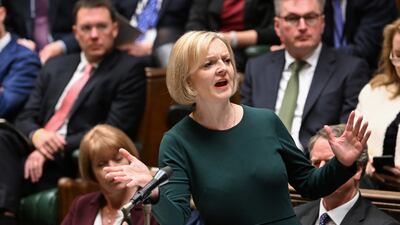Politics is largely a question of judgment and, often, comes down to choosing between the lesser of bad options.
UK Prime Minister Liz Truss is about to discover how unforgiving politics, and her own party, will be over poor decision-making with her pursuit of tax cuts for growth.
The prime minister’s authority is ebbing quicker than the painful eight months her predecessor Boris Johnson endured before his exit from Downing street.
In Westminster’s corridors the almost facetious suggestion after the party conference debacle that a coronation of Rishi Sunak as the new leader was possible is no longer an inane aside.
Three weeks of market turmoil after Chancellor Kwasi Kwarteng’s breath-taking gamble of a mini-budget has rinsed the Tory’s reputation of sound economic management.
Now Ms Truss and her chancellor are watching the economic tornado they unleashed swirl round back devastatingly towards them.
The greatest error was that they went ahead with the unfunded tax cuts despite very direct warnings about the consequences.
What is so worrying about Ms Truss’s judgment is that she relied upon the maverick economic ideology of Prof Patrick Minford, 79.
It was his name she coyly raised during a BBC interview, arguing that cutting taxes would lead to growth despite the interest rate danger.
Mr Sunak, a multimillionaire former chancellor with a strong City CV, pounced on her poor economic grammar, stating that her tax bonanza would amount to a £40 billion ($45.1bn) shortfall, rate increases and that tackling inflation was key to fiscal responsibility.
He continued campaigning for sensible economics, which had wide appeal to the British public but not to the 180,000 Tory membership voting for the next leader.
Entrusting Britain’s future, and more particularly the Conservative Party’s, to the membership’s judgment is no longer a proposition.

There are now a lot of senior and experienced Conservatives on the backbenches ― the result of another questionable decision by Ms Truss to freeze out nearly all Mr Sunak’s backers from government posts.
It is these grandees who it now appears are making the running to unseat the occupants of Downing Street and rapidly replace them with the pairing of Mr Sunak and the much respected Penny Mordaunt, who between them had support of more than two thirds of MPs in the leadership contest.
Ms Truss's survival depends on her actions in the coming hours. A U-turn on slashing corporation tax from 25 per cent to 19 per cent along with a reversal on one other of her giveaways should be enough to satisfy the market’s distress at what actually amounted to £60 billion in unfunded tax cuts.
Whether Mr Kwarteng survives that shredding of his economic reputation will be known in days, if not hours.
He, alongside his leader, may limp on to the fiscal announcement of 31 October but events may well overtake them.
“There is an irony to this,” said the former home secretary Priti Patel. “In that market forces will probably dictate some of these changes now.”
Stability was “crucial” for the markets and British people, she said.
Alicia Kearns, from a different wing of the party, mirrored her thoughts while attacking Ms Truss’s suggestion that there was an “anti-growth coalition” among left-wingers.
“The markets are not left,” she said. “The fact they have been spooked, is something that should be taken incredibly seriously.”
Also spooked are vast numbers of Tories fearful of annihilation in the next general election, purportedly in two years but could come much sooner.
Barely 40 days with a new leader, the timid discussions in Westminster have now become entirely telescopic in their focus for a change at the top.
Under that scrutiny Ms Truss's judgment will need to be exceptional if she is to surpass George Canning’s tenure of 119 days in office as the shortest serving prime minister.






































